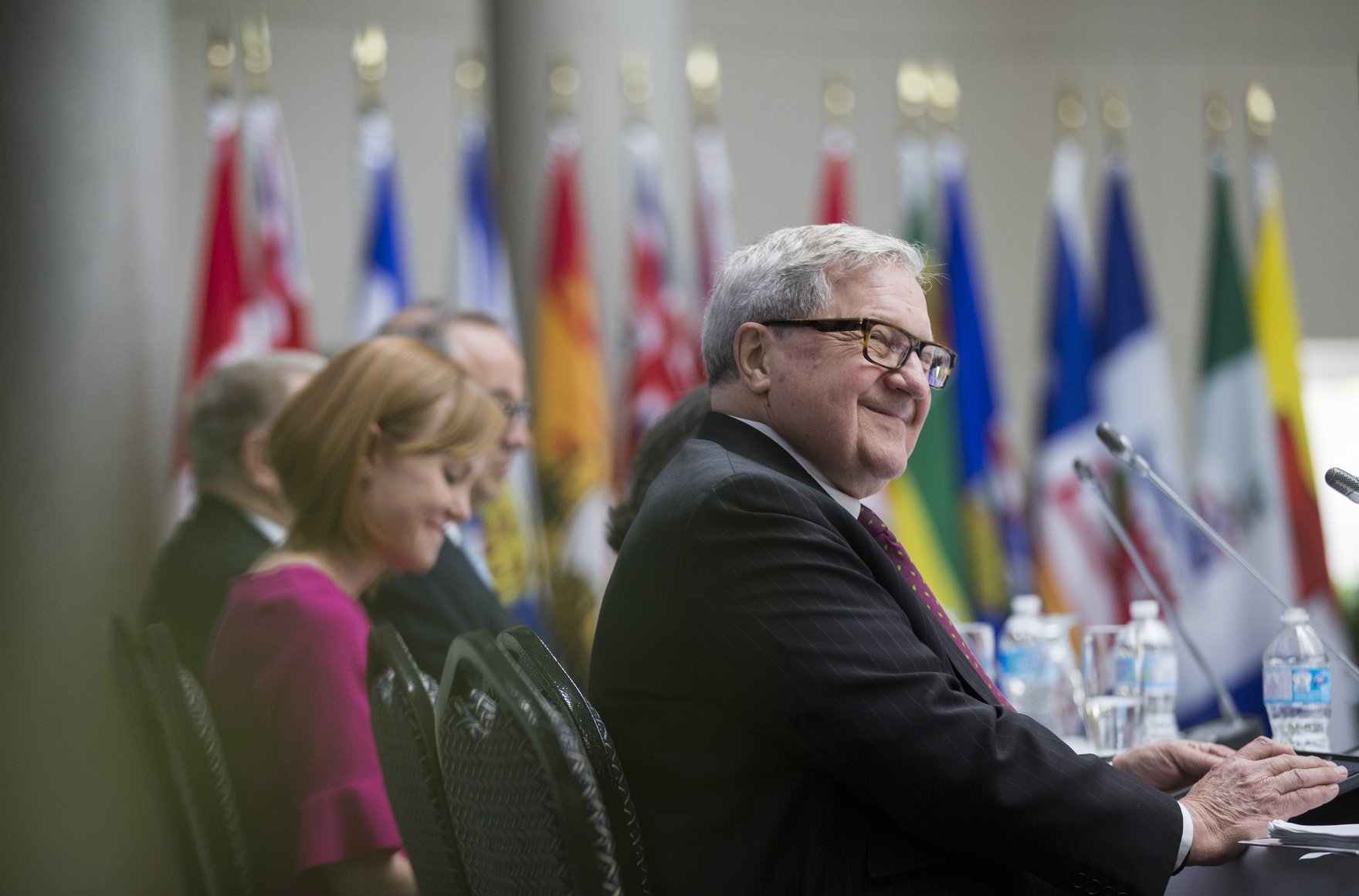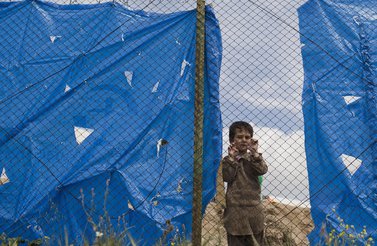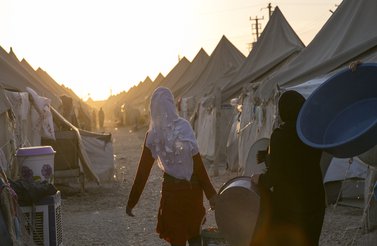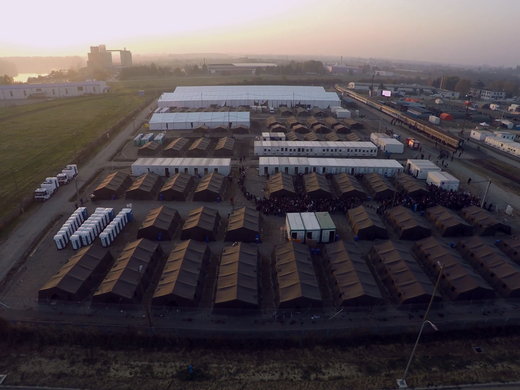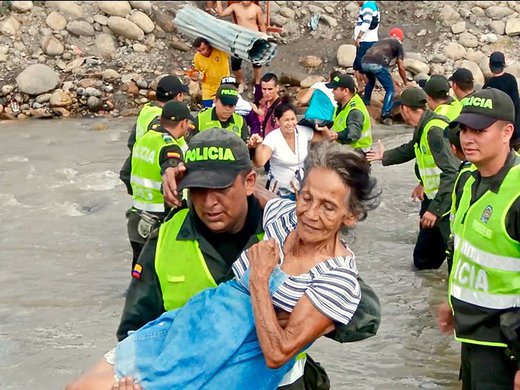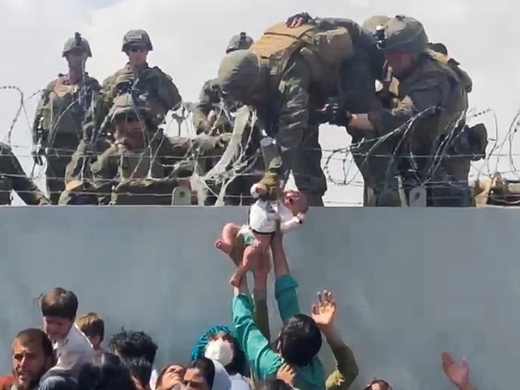In 2016, when the members of the United Nations adopted its New York Declaration for Refugees and Migrants, the number of forcibly displaced persons worldwide was staggering — 65 million, including more than 21 million refugees and 40 million internally displaced persons (IDPs). At the time, member countries agreed to work toward a Global Compact on Refugees and a Global Compact for Safe, Orderly and Regular Migration — both of which were adopted this past December. But the numbers are getting worse; the latest UN data found that 68.5 million people have been forcibly displaced, including 25.4 million refugees and 40 million IDPs.
“I think the oldest human right that is recorded in biblical tracts is the right of sanctuary,” said Lloyd Axworthy, who served as both Canadian Minister of Foreign Affairs and Minister of Employment and Immigration, reflecting on those fleeing persecution, conflict and natural disasters today. “Ancient cities would usually have an area where people who were escaping could find sanctuary. And what are we doing now, in the twenty-first century? We’re closing that off.”
As foreign affairs minister in the 1990s, Axworthy was instrumental in getting the United Nations to adopt the Ottawa Treaty to ban anti-personnel landmines, and was later awarded the North-South Prize of the Council of Europe for his work on the creation of the International Criminal Court and its protocol on child soldiers.
Over the past year and a half, he has chaired the World Refugee Council, an initiative led by the publisher of this site, the Centre for International Governance Innovation. Members of the Council travelled to five continents, consulting with hundreds of experts and representatives from governments, the private sector, civil society and non-governmental organizations (NGOs), as well as with refugees and other forcibly displaced persons.
In a report launched this Thursday,A Call to Action: Transforming the Global Refugee System, the Council is calling for no less than “a major overhaul of the global refugee system to make it fair, effective and efficient in order to protect the interests of the forcibly displaced and the countries and local communities that host them.”
One thing Axworthy wants to make clear is that, from his perspective, A Call to Action is not a report meant “to find a comfortable niche on a shelf.” Despite reports of anti-immigrant political backlash in countries as varied as Germany, Jordan and South Korea, he is hoping the recommendations within the report will make significant headway in addressing what has been called the “defining human rights issue of our time.”
In an interview with OpenCanada this week, Axworthy shared the report’s main takeaways, his thoughts on how to shift the “narrative of fear” being propagated by far-right forces and his hopes for Canada’s refugee policy going forward.
How is this report meant to complement the UN compact processes initiated in 2016?
From a lot of experience, including…working in foreign affairs, you realize that there are some real restraints or limits on that process. [The compact process] did, I think, energize a lot of different governments to look at the scope and extent of the issue, but where the restraints came in was on coming out with concrete, politically based, acceptable solutions.
What we’re putting out is that the negotiations and discussions clearly need a broader [focus on] development opportunities, to provide a choice for people to find means of livelihood, find means of getting identity so they can go to school and get health care. You need to have a development paradigm as well as a humanitarian one. But where do the resources come from to make that happen? What I think is a real concern is that the current system is dependent on voluntary contributions. The pledges are going down — in many cases, the amount of money for humanitarian support has dropped by 30 to 40 percent — so we really have to, in a very practical way, deal with the financial issue.
That is complemented by the need to start holding governments, in particular, accountable for their actions, beginning with the conflicts that [force] millions of people [to] escape and find new safety and security. But we haven’t really developed tools and ways in which that can be implemented. So it’s really to say, let’s take the compact, let’s do what we can to help support the consensus in the UN, but now take it to the next step, which is launching concrete, practical and what we believe will be politically supported proposals and recommendations.
What does the report recommend when it comes to both raising revenue for refugee assistance and holding governments accountable?
It’s actually kind of a cluster of recommendations. I don’t think there’s any one silver bullet. We took a look at a small pilot project in Jordan [where] the European Union provides trade preferences if products are partially made by or involve the labour of refugees — how do you bring that to scale? And can we actually begin making changes and amendments to the World Trade Organization so that those kinds of preferences will provide a new revenue base for people trying to do development for refugees?
Another one is the establishment of some new fiscal instruments like a refugee bond — very similar to what the sustainable development people are doing in terms of “green bonds,” where people can invest in capital to, in the case of refugees, build a school, help with a language program, give women a more effective role in making decisions.
And the third one, which actually, interestingly, provides both an answer to the accountability question as well as the revenue question, is the way in which we’re trying to get governments interested in getting their federal or national courts the right to consider the re-allocation of frozen assets, cutting into the piggybanks of bad guys.
[There’s] the horrible conflict going on in South Sudan, where you’ve got two warlords who are basically creating conflict as a basis of compiling very large amounts of money. We’re saying — the Swiss have already taken action in this regard — simply provide a very clear mandate for mak[ing] an application that the money that’s been sacked away by the bad guys can be released and go back to the region to support refugees, to support humanitarian activity. The World Bank told us there’s about $20 billion sitting in these kinds of frozen assets.
But those are things that cannot be discussed in the UN process, because they cannot discuss money, and they cannot discuss things that have politics to them.
If we could start demonstrating that the refugee system can be reset and altered to really deal with some of the key issues of movement and resettlement, then it’s going to take away a lot of the exploitation that’s now going on by the right-wing political people.
One thing we found in the work of the Council — we went to five continents, we talked to people working on the front line, as well as on the governmental side and the private sector side — there’s a lot of interesting things going on. There’s a lot of people with good intentions and actions...but they’re scattered; they’re not cohes[ive].
To bring these groups and ideas together outside existing hierarchies and systems, you’re proposing to create a “Global Action Network for the Forcibly Displaced.” How would this work?
The UN Refugee Agency is still a vital venue for humanitarian help, but they don’t have a big capacity, say, to do security, to do development, to bring in private sector investment — that’s not their kind of thing. So the idea of the network is it’s a coalition, a clustering if you like, of some key governments — clearly, we need to get some champions on these issues — and international institutions [such as] the Red Cross and World Bank, civil society, etcetera.
That was a model I found successful in some of the reforms that we did around the landmine treaty or on the International Criminal Court, around child soldiers, where we actually got systems changed. A network is a way to connect different resources around a very specific target, goal, objective or plan. That means you don’t have to have consensus. It doesn’t matter if the Russians or the Chinese want to veto something — you just go around them.
Let me give you a working example. [Canadian Foreign Affairs Minister] Chrystia Freeland had that meeting of women foreign ministers [in September] — that’s the beginning of a network to deal with the real discrimination that women refugees face. And you could begin by providing proper training, proper investment in their start-up businesses, and getting them much more involved in the solutions to the problem, because they’re the ones that are usually most heavily victimized.
While travelling and conducting research for this report, was there anything that particularly surprised you?
What shocked me was the existence of so many internally displaced persons, or IDPs. There are more IDPs in Syria than there are refugees. These are people who have exactly the same problem — they have to survive and they’re trying to escape some form of persecution or violence — but they just haven’t crossed a border. There hasn’t really been a proper international recognition of the issue, nor a way of dealing with it.
So we’ve made recommendations, beginning with the simple one that the UN Secretary-General has to appoint somebody full-time to work on it. We [also] have to begin incorporating the rights of IDPs as part of the 1951 Refugee Convention — we’re talking now about 20 million people and growing every day. I think our report will strike some new ground and get governments and the UN thinking much more seriously about the plight of the internally displaced.
Can you share any stories from your time in the field that have really stuck with you?
I have to tell you, I’ve been around the system for a while, but I saw and learned of things that just made me shiver. We were in Colombia just when the large movement of Venezuelans started coming across the border — about five, six thousand a day. What we discovered [from] some of the people in the NGO community was that security on the joint border does not exist. Neither government was able to, or could, or would, provide protection. As a result, you’ve got one of the largest [instances of] sexual abuse offences in the world going on. As one said, the price of crossing the border is, “Give me your daughter.”
It’s things like that that just have to be dealt with — you can’t have refugees being treated in such a vicious way. Security has become a real issue, but that’s not something that’s been part and parcel of the UN’s approach to this. You’ve got a whole peacekeeping unit [that] isn’t really looking at what role they play in providing security for refugees.
The report says that “despite the unique vulnerabilities, as well as capacities, of refugee women and girls, responses are all too often gender-blind or even gender-harmful.” How can countries address this?
I was in the border camps in Tijuana [last year], as the first round of caravans of Central American migrants came. Here I discovered that one of the really, I think, ugly positions taken by the [US President Donald] Trump administration was to eliminate domestic violence and gang violence as grounds for applying for refugee status. So, you had women in these camps who, when they got there, realized that they had no standing. Here’s a place where Canada, where our government, has said women and children are a priority — let’s make it a priority, let’s go and see how we can help people who are really isolated and discriminated against, like women, come here.
While many communities have been welcoming, in many parts of the world we’re seeing a backlash to recent influxes of refugees. How would you counter that?
There’s almost a globalism of indifference that’s going on in the world right now. Not so much the ranting and the raving of the real ideologues or the bigots, it’s just a lot of indifference from so many other people saying, “Oh, well, refugees, they’re druggies and they’re coming into our country”…we kind of forget [people leaving their countries to seek better lives] is the way the world has worked for several thousand years.
I was an elected politician for close to 30 years. One thing I learned is if you actually show people that you can legitimately and effectively make a change that solves a problem, then you don’t have the grievance any more. Now, all you’re getting is a lot of mythology coming out of the mouths of…we don’t have to name names, but we know who they are, just a lot of lies and fabrications. The way to contrast that is to say, wait a minute, [suppose] seven governments got together, along with a group of NGOs, and Médecins Sans Frontières and others, and we’re going to deal with this question of sexual abuse on that border. That’s the kind of thing we need to work on.
You were Pierre Elliot Trudeau’s immigration minister in the 1980s. What lessons did you learn from that experience that you’d like Canadians to keep in mind, as debates around refugee policy — prompted most recently by the Conservative Party’s opposition to the UN migrants pact — continue?
Canada has for the last several decades really been a strong participant in developing international answers to immigration and refugee issues. In [the 1980s] we were managing the whole issue of the Vietnamese boat people. We provided commercial flights — there were no people in rickety boats on the Mediterranean. [Tens of thousands] settled in Canada, and there’s just been an interesting study that says their daughters and sons are now contributing to this country with an incredible presence, with businesses…
What you have to show to people is that it’s being managed well, it’s clearly part of a collaborative arrangement, we have to get away from this kind of “we’re going to do things by ourselves.” This whole thing with the compact, this idea that somehow it was going to restrict our sovereignty…well, I mean, at the same time, that same political party is demanding more trade agreements. What’s a trade agreement? It’s telling you what the rules are when you want to exchange goods and services. That was such a fallacy.
There are some vacuums right now, education I think is failing, both in donor, wealthy, Northern countries and many of the Southern countries, simply because it doesn’t give people the opportunity to understand what a refugee is. I hate to even use the word — it’s just somebody who has been displaced and forced to leave because there’s a war, there’s a conflict, there’s a disease, there’s a drought, there’s a flood, and there’s just bad government. I think what we [need] is better education to have less vulnerability to buying into some of these kinds of fantasies that are being circulated.
Are you hopeful this report will be able to mobilize support for reforming the global refugee system — similar to how you were able to mobilize international support for the Ottawa Treaty?
I think each time you do something like that it leaves a residual. Even now, with all the pushback from the Hungarians and the Americans and the Italians and the Brazilians…Something we did as Canada is we got the United Nations to agree that peacekeepers will protect people. Up to 1999, no division, [no] Blue Helmets, could protect somebody who was being threatened with a killing or a kidnapping 20 feet away.
This report to me is just a marker; the real issue is can we get people to buy into some of these [recommendations], can we get the reforms started. And then once that happens, it will take on its own momentum.
This is also something that Canada — as a people and as a government — is more than adequately eligible to do. We’ve got all the right tools — we just have to put them into play.
This article first appeared on OpenCanada.org.
